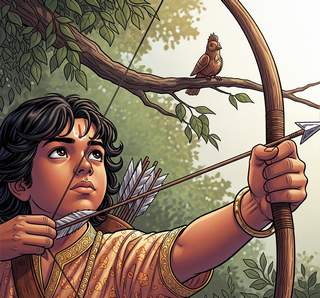
Yudhiṣṭhira, the eldest of the cousins, stepped forward. Thoughtful and observant, he listed everything—the tree, the sky, the bird, even Droṇācārya. Though sincere, his scattered focus did not please the master. One by one, the other princes followed with similarly diffuse answers and were quietly dismissed.
Then came Arjuna. Calm and composed, he raised his bow, gaze locked onto the mark.”I see only the bird’s eye,” he said. Droṇācārya pressed, “Not the tree or branch?” Arjuna held firm.”Nothing else, Guru.” With reverent approval, the master allowed him to shoot. The arrow flew straight and true, striking the eye. That was the hallmark of the legend in the making. Arjuna’s clarity and devotion would shine as a beacon of mastery.
But the tale transcends its setting. It is not merely about talent—it celebrates radical focus. Arjuna’s greatness arose not from divine gifts but from subtraction: pruning distraction, discarding context, meeting the moment with terrifying purpose. His power lay in what he refused to see.
What Arjuna models is not just athletic elegance but cognitive courage—the discipline to silence all competing signals. In today’s age of constant distraction, such mastery feels almost mythical.
Idea for Impact: The modern tragedy is our inability to be Arjuna—to filter out the noise of desire, worry, and superficial validation in pursuit of a single, well-defined aim. This, too, is the bedrock of a well-lived life. And yet, it is a practice too rarely embraced.